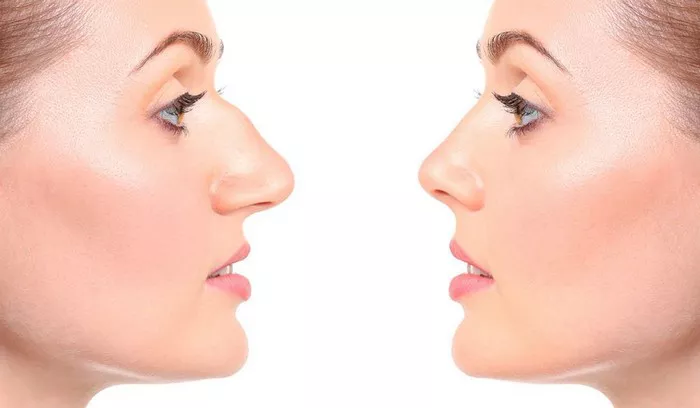Rhinoplasty is a surgical procedure that is performed to reshape the nose. It is a major surgical procedure that requires a significant recovery period. One of the common questions that patients ask is how long the nose is sensitive after rhinoplasty. In this article, we will explore this question in detail.
What is rhinoplasty?
Rhinoplasty, also known as a nose job, is a surgical procedure that is performed to reshape the nose. It can be used to improve the appearance of the nose, correct breathing problems, or both. Rhinoplasty can involve a variety of techniques, including removing or adding tissue, reshaping the bone and cartilage, and altering the shape of the nostrils.
There are two main types of rhinoplasty: open and closed. In open rhinoplasty, the surgeon makes an incision on the skin between the nostrils, allowing for better visibility and access to the underlying structures of the nose. In closed rhinoplasty, the incisions are made inside the nostrils, making the procedure less invasive and resulting in less scarring.
How is rhinoplasty performed?
Rhinoplasty is typically performed under general anesthesia, meaning that the patient is asleep during the procedure. The surgeon will make incisions inside the nose or on the skin between the nostrils, depending on the specific technique being used. The surgeon will then reshape the bone and cartilage of the nose as needed, and may remove or add tissue as well. Once the desired shape has been achieved, the incisions will be closed with sutures.
The procedure can take several hours to complete, depending on the complexity of the case. Patients will typically need to spend several hours in the recovery room after the procedure to allow the anesthesia to wear off and to monitor their vital signs.
How long is the recovery period after rhinoplasty?
The recovery period after rhinoplasty can vary depending on the individual patient and the specific techniques used during the procedure. In general, patients can expect to experience some swelling, bruising, and discomfort for several days after the procedure. The swelling and bruising can take several weeks to fully resolve, and patients may need to wear a splint or cast on their nose for several days or weeks after the procedure.
Patients should plan to take several days off from work or school after the procedure to allow for rest and recovery. They should also avoid strenuous activity, including exercise, for several weeks after the procedure to avoid exacerbating swelling and discomfort.
How long is the nose sensitive after rhinoplasty?
The nose can be sensitive for several weeks or even months after rhinoplasty. This sensitivity can manifest in a variety of ways, including:
Pain or discomfort: Patients may experience pain or discomfort in the nose for several weeks after the procedure. This pain can be managed with pain medication prescribed by the surgeon.
Swelling: Swelling is a common side effect of rhinoplasty, and it can take several weeks or even months to fully resolve. The nose may feel tender or sore to the touch during this time.
Numbness: Some patients may experience numbness in the nose or surrounding areas after rhinoplasty. This numbness can last for several weeks or months, and it may take some time for sensation to fully return.
Sensitivity to touch: The nose may be sensitive to touch for several weeks or months after rhinoplasty. Patients should avoid touching or bumping the nose during this time to avoid exacerbating the sensitivity.
Sensitivity to temperature: The nose may be sensitive to temperature changes for several weeks or months after rhinoplasty. Patients should avoid exposing the nose to extreme heat or cold during this time.
Dryness: The nose may feel dry or congested for several weeks after rhinoplasty. This can be managed with saline nasal sprays or other moisturizing products.
Stiffness: The nose may feel stiff or tight for several weeks after rhinoplasty. This can be managed with gentle massage and stretching exercises recommended by the surgeon.
Discomfort when smiling: Some patients may experience discomfort or tightness in the nose when smiling for several weeks after rhinoplasty. This is normal and should resolve over time.
Difficulty breathing: Some patients may experience difficulty breathing through the nose for several weeks after rhinoplasty. This can be managed with saline nasal sprays or other products recommended by the surgeon.
It is important for patients to follow their surgeon’s post-operative instructions carefully to ensure a smooth and successful recovery. This may include taking prescribed medications, avoiding certain activities, and attending follow-up appointments with the surgeon.
Conclusion
Rhinoplasty is a major surgical procedure that can improve the appearance and function of the nose. The recovery period after rhinoplasty can vary depending on the individual patient and the specific techniques used during the procedure. The nose can be sensitive for several weeks or even months after rhinoplasty, and patients may experience pain, swelling, numbness, sensitivity to touch and temperature, dryness, stiffness, discomfort when smiling, and difficulty breathing. Patients should follow their surgeon’s post-operative instructions carefully to ensure a smooth and successful recovery. If patients have any concerns about their recovery or the sensitivity of their nose after rhinoplasty, they should contact their surgeon for guidance.


